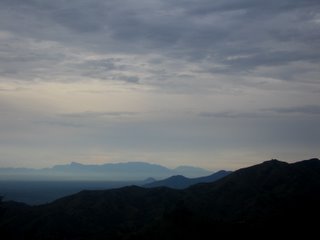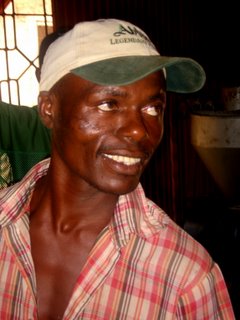

Day 4: Into the Mountains
So, to work, with our partners UMADEP (Uluguru Mountain Agricultural Development Project) who have been operating in Mgeta and Mkuyuni since 1993, and work as an integrated agricultural development programme using a multidisciplinary approach to education.
We visit the office of Chuo Kikuu Cha Sokoine Cha Kilimo Mradi Wa Knendeleza Kilimo Millma Ya Uluguru (Kimu) and as is custom introductions and thanks are reciprocated. Whilst there seems always to be a slight nervousness, almost shyness to these early exchanges, they do not express embarrassment or mere sentiment. Quite the contrary, there is deep appreciation on both sides of our partnership for the commitment to one another, and more importantly the benefit that brings to the poor of this world. Today is no exception; in the silence before words there is an understanding and gratitude between two groups of people who in many respects are worlds apart, and yet at the same time inseparable.
Emmanuel Malisa (Agricultural Officer Supervisor) tells us initially what we already know, that this is a partnership whose projects are in their formative stages. He explains that the sunflower crop trials found their beginning in 2003 alongside sesame seed and groundnuts, with an objective to see which one was adaptable to the environment as a consequence of its performance.
It seems that the growing of sunflowers surpassed all expectations with sadly mixed results from sesame and groundnut. Part of the brilliance of this project though is the way in which the farmers groups are involving primary schools so that the practices passed on by UMADEP to the farmers can in turn be taught to the children – who will in turn inform their parents. We visit one such school whose students would have us believe that they prefer to learn of agricultural principles than play football…. I do not judge the comment; I just smile and become thankful for the spirit of African children.
We then go to visit a project that shows just how partnership can transform the lives of those who have so little. Freddy is a wonderful example of someone who has benefited from the improvement of sunflower processing for oil. With his new machine the process becomes economically more lucrative – the practice is quicker and produces better quality oil so fetching a higher price at market. So much so, he can now afford to send his two daughters to school. The pride in his somewhat shy eyes moves me very much. I leave Freddie with a warmth in my heart.
Over the next two hours of driving we climb most of the 2650m high luxuriant Mountain Range, and there, we meet many farmers who are fortunate to have nature on their side, with the mountains natural resource of water allowing the land to be more fruitful. Refined development models are practiced with the careful guidance of UMADEP, with a keen emphasis on empowerment and enabling beneficiaries to be agents of their own change.
We find it refreshing to see evidence of productive engagement between NGO and government services with good capacity to engage with communities through a range of activities: farming, schools, NGO education programmes, savings and credit schemes, economic enhancement such as sunflower processing and seed potato sales. The local hospital at Mgeta houses demonstration energy saving stoves, so that the relatives of patients support the recovery of dependants and learn the value of appropriate technologies at the same time.
UMADEP has been operating in the Mgeta and Mkuyuni divisions since 1993 and works as an integrated agricultural development programme using a multidisciplinary approach which is implemented with the collaborative efforts of the Department of Agricultural Education, Sokoine University of Agriculture, the District Co-operative Office and Farmers Groups Networks in Mgenta, Mkuyuni and Mvomero.
We learn from Emmanuel that their aims and objectives are that the projects assist and so ‘consolidate the rural society in its complexity to constantly play an active role for its betterment in the changing overall socio-economic environment.’ Its purpose is to improve the productivity of labour of small-scale farmers in the Morogoro District in a sustainable way. To associate the university with the rural communities so to enable the promotion of the small scale farmers movement and to train farmers, students and professionals to develop a methodology that constantly that links and informs reflection to action.
As the sun sets over the stunning mountain range I reflect rather philosophically about the people we have met today. I think particularly of Freddy, and I smile as I recall his own smile. Freddy is a happy man because he now has a future. Surely we all entitled to that…

No comments:
Post a Comment